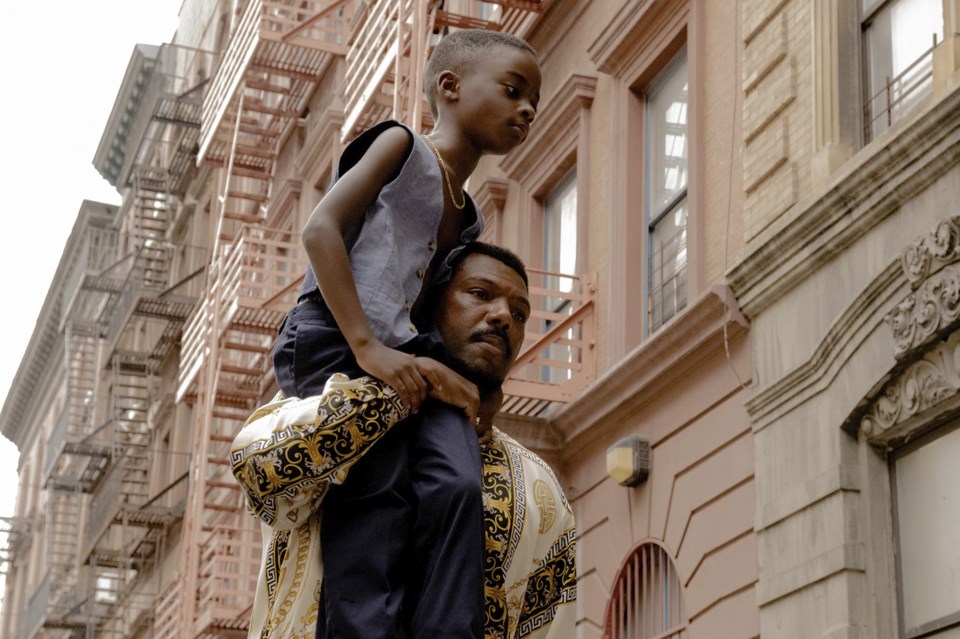There is a dread that hovers over “ A Thousand and One,” writer-director A.V. Rockwell’s remarkably vivid and tender debut feature about a mother and son in New York in the 1990s.
The film does not play out like a mystery or a thriller — it’s about the mundanities and trials of life with a kid in a city that has always been the most hostile to its most loyal. But it does begin with a crime and from that point on, you’re on edge waiting for the other shoe to drop.
“A Thousand and One” drops you into New York in 1994 as a young 20-something Inez (the positively electric Teyana Taylor ) returns to Harlem after 18 months behind bars in Rikers. From the first low angle shot of her walking through the neighborhood, in a striking red crop top tank, hair parted slickly to the side to Gary Gunn's catchy and defiantly anti-sentimental score, you have an acute sense of this character (and possibly the director, too). This is not a timid wallflower. She is confident, determined and not to be trifled with.
Though we’ve just met this woman, it does not then come as a total surprise when she decides several scenes later to take her 6-year-old son, Terry, away from foster care without permission. This is, she knows, kidnapping, but in her mind it’s the only way to get him back in her care. He’s recently been hospitalized after trying to jump out a window to escape and his situation seems dire enough for immediate intervention.
Yet the question of why she won’t, or can’t, go through the system lingers and haunts everyone for the next 11 years: Inez, Terry, who gets a new name (Darrell) and papers, and Lucky (William Catlett), Inez’s on-and-off partner and Terry’s father.
Terry/Darrell is played by several wonderful actors through the course of the film: Aaron Kingsley Adetola at age 6, trying to figure out whether he can trust the woman who left him parentless again; Aven Courtney at age 13, navigating the city during its deplorable stop-and-frisk era; And Josiah Cross at 17, wrestling with his academic gifts and his future.
Throughout his relationship with Inez remains complex. There are moments of harmony and tenderness, pain, disagreements and disappointments – especially in what he perceives as her inability to keep Lucky around and in their lives. You empathize some with Terry, but Inez is the one that captures your heart. She may not be a storybook mother, all songs and soft words, but she’s a fiercely loyal warrior, the one you’d want going to bat for you in any variety of situations.
The backdrop to “A Thousand and One,” which earlier this year won the top prize at the Sundance Film Festival, is a rapidly changing city. Sometimes Rockwell will layer in speeches from mayors Rudolph Giuliani or Michael Bloomberg that help establish the broader context of their environment – like a crackdown on jaywalking as the city crumbles. There are rumblings of people buying up entire buildings in their neighborhood and soon, a new white landlord is overseeing the building Inez and Terry live in. At first, he seems helpful. Then it becomes clear that he’s really trying to squeeze them out, leaving them with a unusable bathroom and kitchen and claiming that the only way his guys can do the repairs is if they vacate the unit for weeks.
Rockwell has called “A Thousand and One” more of a heartbreak letter than a love letter to New York, which is the best possible description of this movie and the relationship these characters have to their home and one another. It’s also about the isolation of mothers who sometimes just need a little bit of support themselves.
This is not a movie that will leave you feeling especially warm and fuzzy – it is often devastating. But it’s also bursting with hope for the future in this deeply human story of how one woman decided to devote her life to ensuring that her son’s would be brighter.
“A Thousand and One,” a Focus Features release in theaters Friday, is rated R by the Motion Picture Association for “language.” Running time: 117 minutes. Three and a half stars out of four.
—-
MPA Definition of R: Restricted. Under 17 requires accompanying parent or adult guardian.
—-
Follow AP Film Writer Lindsey Bahr on Twitter: www.twitter.com/ldbahr.
Lindsey Bahr, The Associated Press

